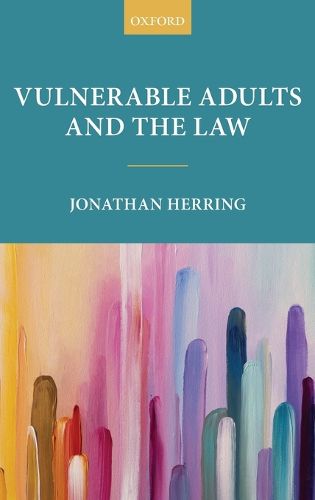Readings Newsletter
Become a Readings Member to make your shopping experience even easier.
Sign in or sign up for free!
You’re not far away from qualifying for FREE standard shipping within Australia
You’ve qualified for FREE standard shipping within Australia
The cart is loading…






We are used to thinking that most people have the capacity to make their own decisions; that they should be free to decide how to live their lives; and that it is a good thing to be self-sufficient. However, in an examination of the legal position of vulnerable adults, understood as those who have capacity under the Mental Capacity Act 2005 but are deemed impaired through vulnerability in their exercise of decision making powers, Jonathan Herring challenges that assumption. Drawing on feminist and disability perspectives he argues that we are all in fact, ‘vulnerable’ and we need to replace the competent, able-bodied, independent person as the norm which the law is based on and instead fashion which recognises our interdependence and mutuality.At the heart of the law is a distinction between those who have capacity and those who do not. Those who have capacity are given the full rights of the law; they are entitled to enter contracts, dispose of their property, are able to marry. Those who are deemed to lack capacity are unable to make these decisions. Their decisions are made on their behalf based on an assessment of what is in their best interests. This approach is underpinned by the principle of autonomy, and is problematic for those who are deemed ‘vulnerable’. The Court of Protection and the Court of Appeal have developed a jurisdiction to deal with cases involving vulnerable adults which has been used in a wide range of cases from those involving people with early stage dementia to cases of forced marriage. This development of law has proved controversial and the courts have struggled to draw its limits and explain the justification for it. Jonathan Herring welcomes the courts willingness to protect vulnerable adults through the inherent jurisdiction, but argues that we need to go much further. It is not just particular groups such as ‘the elderly’ or ‘the disabled’ who are vulnerable, but rather vulnerability is part of the human condition. This means that caring relationships are of central significance to our society and should be at the heart of the legal system.
$9.00 standard shipping within Australia
FREE standard shipping within Australia for orders over $100.00
Express & International shipping calculated at checkout
We are used to thinking that most people have the capacity to make their own decisions; that they should be free to decide how to live their lives; and that it is a good thing to be self-sufficient. However, in an examination of the legal position of vulnerable adults, understood as those who have capacity under the Mental Capacity Act 2005 but are deemed impaired through vulnerability in their exercise of decision making powers, Jonathan Herring challenges that assumption. Drawing on feminist and disability perspectives he argues that we are all in fact, ‘vulnerable’ and we need to replace the competent, able-bodied, independent person as the norm which the law is based on and instead fashion which recognises our interdependence and mutuality.At the heart of the law is a distinction between those who have capacity and those who do not. Those who have capacity are given the full rights of the law; they are entitled to enter contracts, dispose of their property, are able to marry. Those who are deemed to lack capacity are unable to make these decisions. Their decisions are made on their behalf based on an assessment of what is in their best interests. This approach is underpinned by the principle of autonomy, and is problematic for those who are deemed ‘vulnerable’. The Court of Protection and the Court of Appeal have developed a jurisdiction to deal with cases involving vulnerable adults which has been used in a wide range of cases from those involving people with early stage dementia to cases of forced marriage. This development of law has proved controversial and the courts have struggled to draw its limits and explain the justification for it. Jonathan Herring welcomes the courts willingness to protect vulnerable adults through the inherent jurisdiction, but argues that we need to go much further. It is not just particular groups such as ‘the elderly’ or ‘the disabled’ who are vulnerable, but rather vulnerability is part of the human condition. This means that caring relationships are of central significance to our society and should be at the heart of the legal system.